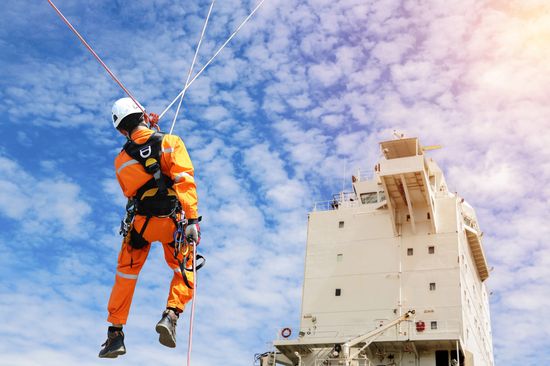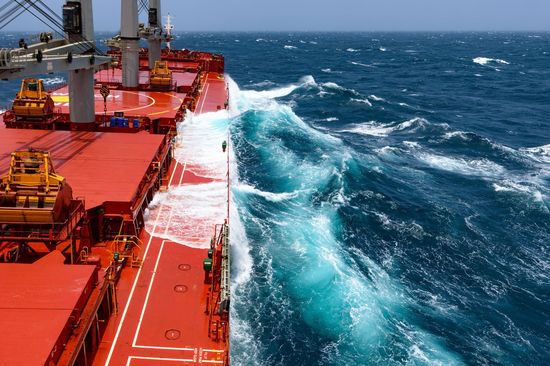Fostering safe solutions to future challenges

The continuous global increase in ocean-going traffic and the emergence of new technologies such as
autonomous driving and alternative propulsion systems are constantly giving rise to new safety issues in shipping. The Maritime Safety and Security specialist group, launched in January 2018 and led by the Maritime Cluster Northern Germany (MCN) regional office in the north German state of Mecklenburg-Western Pomerania, has made finding the right solutions to these emerging problems part of its mission. The group, which complements existing programmes and projects organised by other institutions and associations, aims to promote cross-sector networking and collaboration between individual players. “We are constantly working to identify current and future hotspots in civil maritime safety and to provide impetus to innovative projects,” explains Dr Dana Meissner, head of the specialist group and director of the research & development department at the Rostock-based Institute for Safety Technology/Ship Safety. The group also places ist focus on ships, ports, traffic routes, goods, passengers and people working in the maritime industry.
One of the current megatrends involves helping the global shipping industry transition to more eco-friendly forms of propulsion. The International Maritime Organization (IMO) requirement that ships either only use low-sulphur fuel on the open seas or adequately filter exhaust gases is the greatest technical challenge facing the industry. Safety aspects also play an important role here – and there are not always satisfactory answers. “One of the solutions under discussion is replacing the still standard heavy fuel oil with liquid natural gas,” Meissner explains. “But it has to be cooled down to minus 163 degrees Celsius to refuel a ship – which, of course, also raises some safety issues.”
The rapid growth in the size of container ships is putting an increased focus on safety concepts.

The continuous global increase in ocean-going traffic and the emergence of new technologies such as
autonomous driving and alternative propulsion systems are constantly giving rise to new safety issues in shipping. The Maritime Safety and Security specialist group, launched in January 2018 and led by the Maritime Cluster Northern Germany (MCN) regional office in the north German state of Mecklenburg-Western Pomerania, has made finding the right solutions to these emerging problems part of its mission. The group, which complements existing programmes and projects organised by other institutions and associations, aims to promote cross-sector networking and collaboration between individual players. “We are constantly working to identify current and future hotspots in civil maritime safety and to provide impetus to innovative projects,” explains Dr Dana Meissner, head of the specialist group and director of the research & development department at the Rostock-based Institute for Safety Technology/Ship Safety. The group also places ist focus on ships, ports, traffic routes, goods, passengers and people working in the maritime industry.
One of the current megatrends involves helping the global shipping industry transition to more eco-friendly forms of propulsion. The International Maritime Organization (IMO) requirement that ships either only use low-sulphur fuel on the open seas or adequately filter exhaust gases is the greatest technical challenge facing the industry. Safety aspects also play an important role here – and there are not always satisfactory answers. “One of the solutions under discussion is replacing the still standard heavy fuel oil with liquid natural gas,” Meissner explains. “But it has to be cooled down to minus 163 degrees Celsius to refuel a ship – which, of course, also raises some safety issues.”
Another major issue is cyber crime. After hackers attacked a large container-shipping line in 2017 and
paralysed it for days, the maritime industry has been alarmed. “Since more and more things are being networked, criminals can now paralyse entire large logistics chains by interfering at a single spot,” Meissner emphasises. “What may have been a local problem in the past now has a global impact.” Safety aspects in autonomous or semi-autonomous driving, the automation of loading and unloading processes in ports, and the trend towards having bigger and bigger passenger ships with several
thousand people on board are just some of the other topics.
Given the complex nature of these topics, the specialist group attaches great importance to bringing players from a very wide range of fields to the table. In addition to small and medium-sized companies
in the maritime sector, these are mainly research & development establishments and educational institutions. In all of this, the MCN’s specialist group views its role as being a moderator and driving force. “For us, it is first and foremost about getting companies with a specific need talking with researchers who might be able to come up with a solution,” Meissner says. Networking is a means to an end. “The goal of our activities is really to provide the nudges needed to develop concrete new products as well as modifications in processes,” the group’s head underlines.